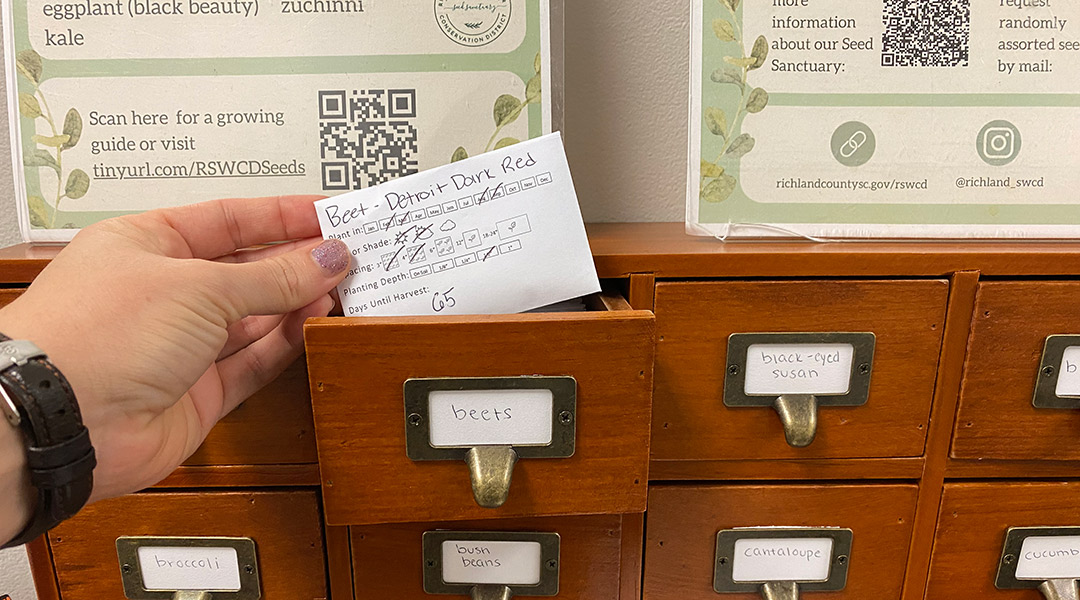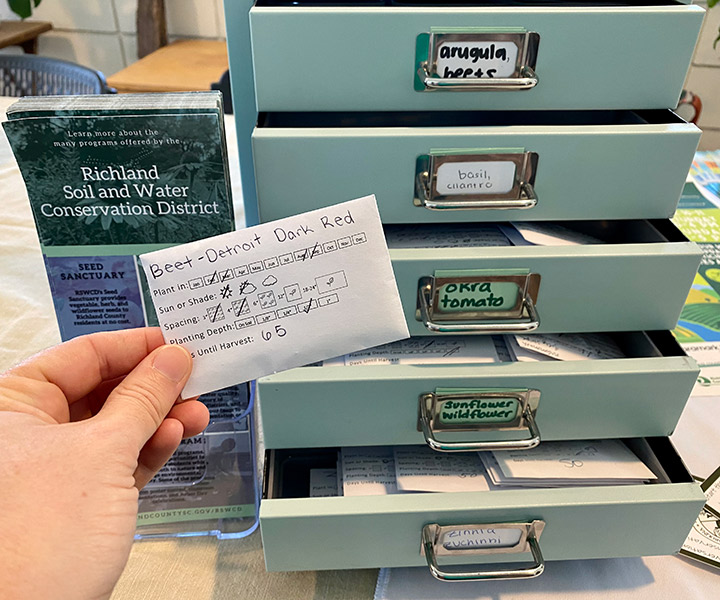Seeds are stored in packets in an old card catalogue cabinet at the Seed Sanctuary’s physical location in Richland County. (Photos courtesy of the Richland Soil and Water Conservation District)
You can now get seeds for free by mail or in person from the Seed Sanctuary in Richland County at its new physical location.
The program offers a variety of seeds from vegetables to herbs and flowers, Diana Llaca said.
Llaca oversees community outreach for the Richland Soil and Water Conservation District, which is home to the new location, and helps run the program.
“A previous employee, she was also a USC student who was an intern with the Soil and Water District, wanted to start this project to promote home gardening and food security and pollinator conservation,” said Chanda Cooper, the education coordinator for the conservation district.
The seed library also has been an effective way to connect with the community while spreading awareness about the district’s mission, Cooper said.
Education is a big part of the Seed Sanctuary, Cooper said. The district hosts events in schools and in the community to promote home gardens and sustainability.
“Obviously, a large part of Richland is the city, a large part isn’t,” Llaca said. “We want to have people know where their food comes from, how it happens and also all the benefits that come with that.”
Sustainable Carolina at the University of South Carolina worked with the Seed Sanctuary last year to help volunteers pack seeds to mail out, said Claire Hanson, Sustainable Carolina’s project coordinator.
“It’s definitely important for students to learn about gardening and having their own source of food,” Hanson said. “So that really speaks towards food security and just being able to provide for yourself.”
After receiving funding from the National Association of Conservation Districts, the original plan was to open a seed library at the district’s offices in 2020.
But the pandemic shut everything down.
“We had to kind of retool very quickly, and we did offer seeds by mail that first year,” Cooper said. “And then in the second year, we opened a physical location at the Richland library Eastover branch.”
Two grants from Dominion Energy helped the group continue sending seeds by mail and to move its physical location out of the Richland library.
District employees order the seeds in bulk from the Eden Brothers, a bulk seed company, and come with instructions on how to plant, maintain and harvest the plants.
The Seed Sanctuary partners with Clemson Extension to provide online growing guides on its website, Llaca said.
More than 300 people or organizations requested seeds by mail from the library the first week of the expansion in February, Llaca said.
And there’s been a lot more foot traffic since the new library opened, she said.
“People are really taking advantage of the program,” Llaca said.
If the Seed Sanctuary continues to grow, Llaca said, the district would like to bring in more volunteers to help with popup events and mail orders.
Several other conservation districts have launched their own seed programs in response to the Seed Sanctuary in Richland, Cooper said.
“I think home gardening is a gateway to conservation-mindedness and environment stewardship in general,” Cooper said. “Growing a plant from a seed, whether it’s in a pot or on your balcony or in your yard or garden, is just a great way to connect with the land, connect with the resources and kind of learn to appreciate how the environment sustains life.”



